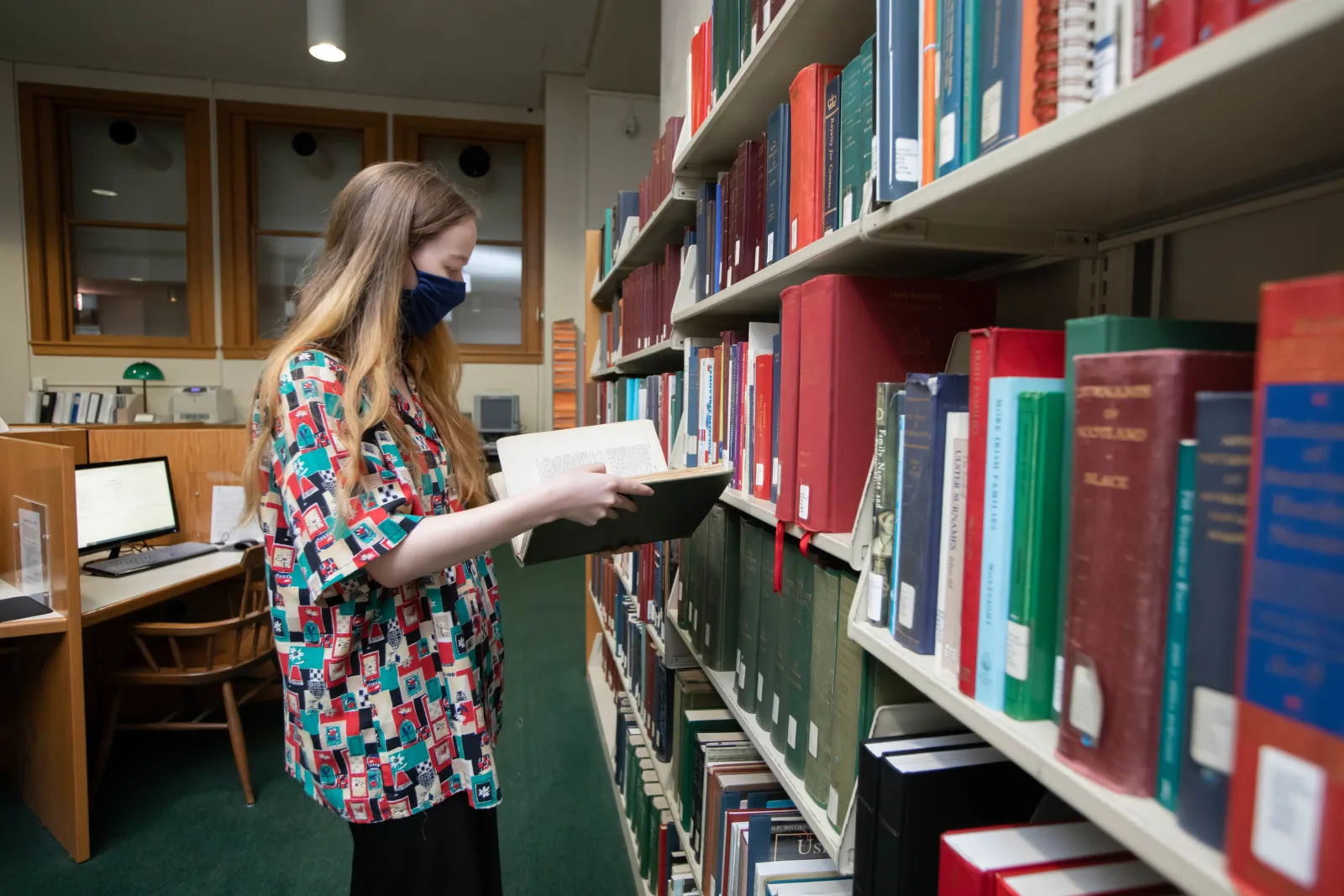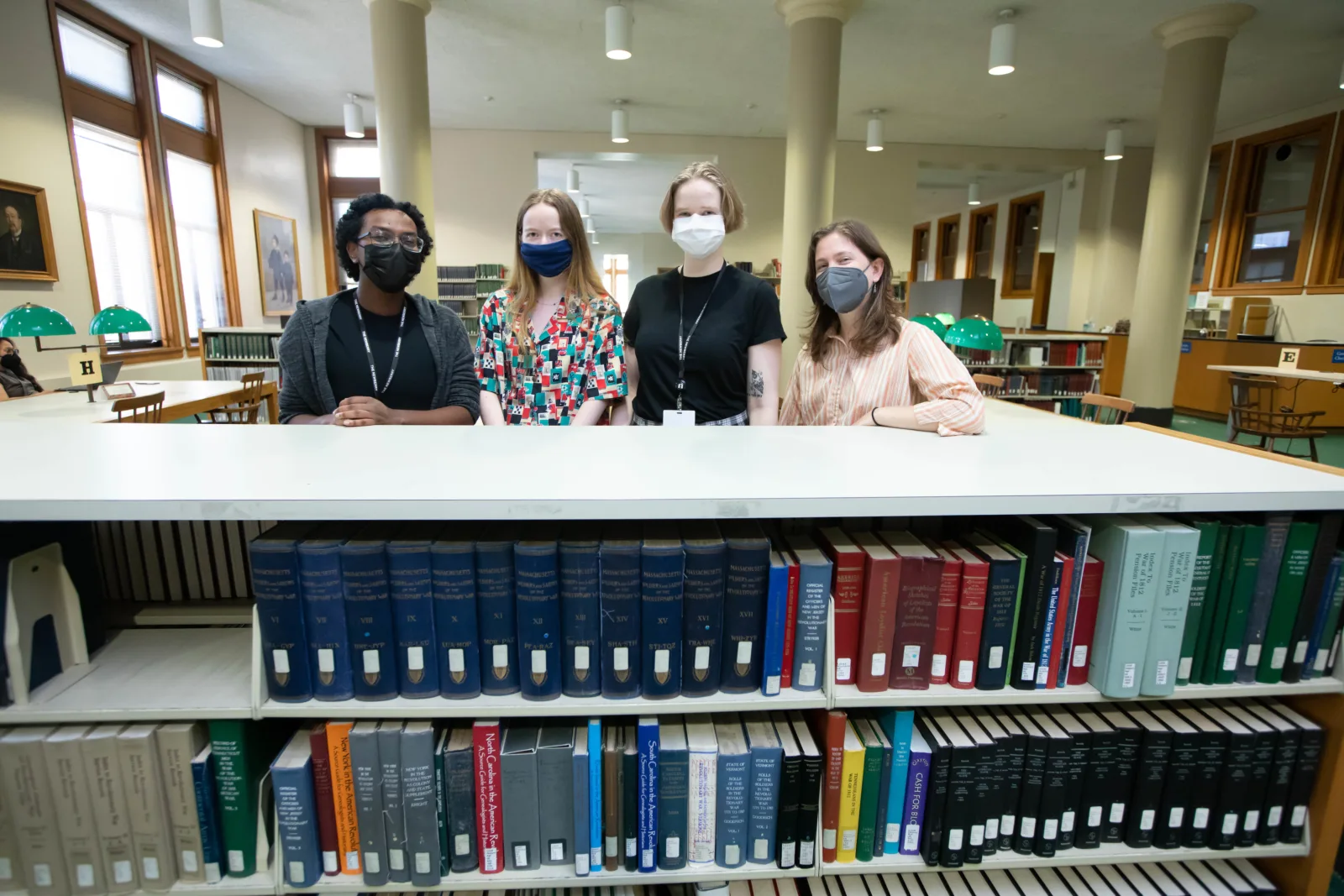Each summer, the Newberry teems with life and learning as Summer Institutes bring scholars from across the country into our reading rooms. To help the Newberry accommodate this flurry of activity, we hire several Summer Library Assistants. These roles serve as an excellent introduction into library sciences for early-career librarians, teachers, and other humanities professionals.
For this edition of Donor Digest, we bring you an illuminating discussion with our 2022 Summer Library Assistants: Wren Ambroise, Tyler Guerin, Lucy Kates, Elynnor Sandefer, and Quinn Sluzenski.
What brought each of you to the Newberry?
Lucy: I first heard about the Newberry from a friend in grad school. We went to the Crossings exhibit last winter and I remember being amazed by the breadth of the collection, even in a specific category like maps. That led me to do more research about the collections and the Newberry community itself. I’m interested in education and in library work, so when the opportunity came up to work here, it seemed like a really cool opportunity to integrate the two.
Quinn: I moved to Chicago four years ago and at some point—I would guess in the first month—I learned that the Newberry existed. I’m a big nerd about libraries and archives. I was interested in library sciences as a kid but was told it wasn’t very practical. About a year after graduating from college, I decided I didn’t care about the impracticality anymore and went back to my interest in pursuing it. So, when I saw the Newberry job listing, I thought, “Let’s see what happens!”
Wren: I’d been thinking about the practicality of library sciences jobs, too. At some point, I decided to bite the bullet and start applying for library science schools and start working library jobs. I actually hadn’t heard of the Newberry before, but I’m very familiar with the John Crerar Library, another Chicago research library that worked with the Newberry a lot in its early history.
Elynnor: I’ve always been interested in libraries as community spaces where informal learning happens, and I’ve been working in public libraries for a few years now, but the Newberry is the first research library that I’ve spent time in as a worker or a learner. I first learned about it from an undergraduate class I took at Northwestern about Native literature in and of Chicago taught by Kelly Wisecup (a 2021–22 Newberry Fellow and current NCAIS Summer Institute instructor). Through that class I learned about what the Newberry is doing to build reciprocal relationships with Indigenous communities. That got me interested in learning more about other library types and the Newberry in particular, so I was really excited to see this job come up.
Tyler: I first learned about the Newberry when I was at Kenyon College. I had friends who participated in the Associated Colleges of the Midwest undergraduate program. When I first heard about the Newberry, it almost seemed too good to be true that there was this place that could be so focused on the humanities in a world that, for better or for worse, focuses a lot on science, technology, and business. Since learning about the Newberry, it’s been one of my favorite institutions. When I was moving to Chicago, even though it was for a teaching job, I wanted to find a way to get involved here. I’m very proud to be working here. It’s one of those experiences that, once I’m gone, I’ll always be proud that I had.
In your first weeks here, what has surprised you?
Lucy: We’ve been doing some processing for the Curt Teich Postcard Archives Collection acquisitions and I didn’t know that was an element of the collections. Keva Kreeger, one of the General Collections Library Assistants, was talking to us about an author who had given a presentation in cultural studies and had incorporated the postcards. Between learning about the postcards and things like the sheet music collection, there are a lot of elements of the collection that have surprised me and expanded my understanding of what artifacts can be studied.
Elynnor: I definitely feel staggered by the enormity of the collection, especially in terms of collection maintenance. There are millions of things here and new acquisitions are coming in all the time. In that same sense, I feel very impressed by the librarians’ care, creativity, and expertise.
Wren: On a similar note, I’ve been interested in all the measures taken to protect the books: the fire doors; the vault setting where all the oxygen is removed from the room if there is a fire. I was also just looking at some boxes that were made to the exact size of the books they hold, to protect them from harm. One book had clasps, so its box had divots in it specifically designed to fit those clasps.
Tyler: It’s something astounding that on a single stroll through the stacks you can pass a first edition of Leaves of Grass, the Popol Vuh, a medieval manuscript, and a map Hernán Cortés had made when he was trying to convince the Spanish king to invade what is now Mexico City. I think it’s really amazing to see them hands-on, and it drives home how one-of-a-kind the Newberry is. I know there are other humanities research libraries, but as far I’ve learned, the public facing aspect of the Newberry is unique. Anyone over the age of 14 can come at look at these materials. That’s a really special thing.
Quinn: I want to echo what Tyler said about the general accessibility of the Newberry, which I don’t think I fully realized. I’d heard that the Newberry is open to everyone, but I thought there were stipulations. I thought it was just open for public exhibitions, but that you needed an academic affiliation to use the reading rooms. But that’s not true. Also, yesterday I paged a map that was larger than me.

Given the temporary nature of these positions, many folks who take them on are looking ahead to their future goals. What do you hope to gain from your experience this summer?
Quinn: I’m interested in pursuing a Master of Library Sciences degree, so this is a foundational step in what I would like to be a lifelong career in information sciences. We talk a lot about how the Newberry isn’t like many other libraries. I feel like this summer is going provide me experience in working both with patrons and researchers and with the collection.
Lucy: It’s definitely felt like the first couple weeks of this job have been learning the systems that keep the library running. It’s been amazing to get a deeper understanding of the inner workings of library systems—learning library software, learning to locate things, paging, re-shelving. I’m excited throughout the course of the summer to do more public-facing work and use what I’ve learned to help readers and researchers reach the information that they’re looking for. It’s inspiring and makes me want to prioritize working with primary sources in the future.
Wren: I agree. I feel like in the last few weeks I’ve learned so much more than I could have expected. I just want to keep gaining experience, working with the researchers, learning about books. I’ve learned to really appreciate the aesthetics of books while I’m here. I don’t think I had that before. Now I get to look at so many interestingly made books all day.
Tyler: I don’t know of anywhere else in the world where you can, as a member of the public, read a medieval manuscript while sitting next to a scholar who may have already written a book about that manuscript. That junction between the public sphere and academic sphere, those two seemingly different worlds and communities, really interests me. I’m going to be a humanities public educator so learning how to connect those worlds excites me.
Elynnor: I’d like to learn more about how the library operates and what its role is as a cultural institution. When you hear people speak about why they love the Newberry, they talk about seeing the humanities in motion. As we move on from training to be more on the desk talking to people about their research, I’ve started to experience more of the human element of the place. That’s what I’ve always loved about libraries.
This story is part of the Newberry’s Donor Digest, Summer 2022. In this newsletter, we share with donors exciting stories of the work made possible by their generosity. Learn more about supporting the library and its programs.
